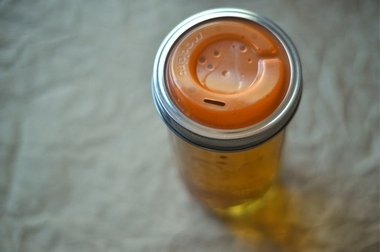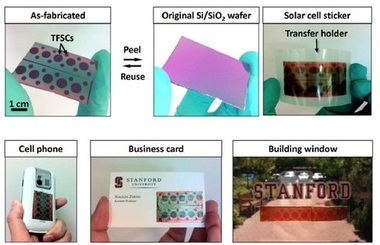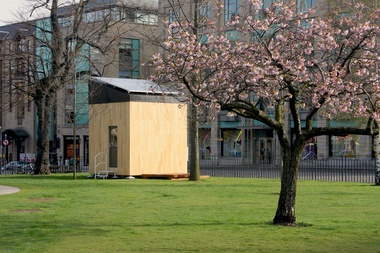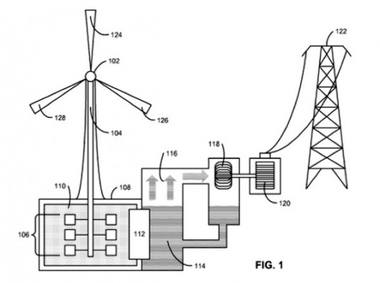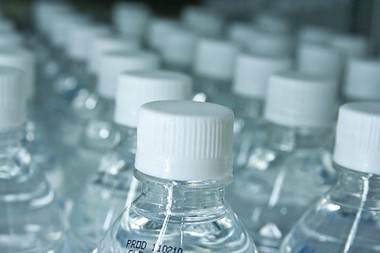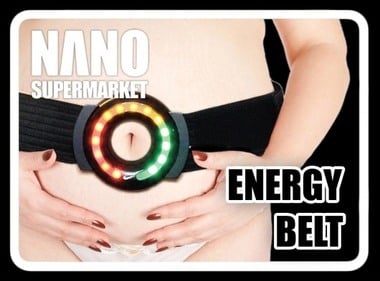Cuppow!
Say it out loud. Really loudly. You know you want to.
Cuppow is a reusable lid that turns any jar with a standard mouth into a drinking vessel. Canning jars, mason jars, jam jars—now they can all be used to drink from without slopping your smoothie down the front of your shirt. The Cuppow lid can be sipped-from directly, or you can poke a straw through the opening for a more genteel drinking experience. The lid is made of phthalate- and BPA-free plastic, is completely recyclable, and will likely last you for years.
Peel-and-Stick Solar Panels
The brilliant beasties over at Stanford have created peel-and-stick solar cells that could revolutionize the way we use solar energy. The cells, made of a silicon, silicon dioxide and metal “sandwich”, are topped off with thermal release tape that allows them to be peeled off and stuck to surfaces such as paper, plastic, fabric, glass… just about anything you can imagine.
Tiny Houses
Last year seemed to be the year of the tiny house. Though 2011 took great strides with buildings like the teensy Eco Cube, 2012 saw an enormous number of small-scale, eco-friendly houses being built around the globe. Though miniscule “survivalist” dwellings like these might be a bit extreme, cute little dwellings like those created by the Tumbleweed Tiny House company and Twelve 3 manage to combine sustainable living with adorable, innovative design. This past June, the most recent creation by the Micro Compact Home company was installed near Lake Maggiore in Switzerland, and is an absolute work of art, complete with double beds, a modern bathroom, great storage, and a modern kitchen. These tiny buildings prove that you don’t need a lot of space to live in style, and sustainable living doesn’t necessarily equal living in forest yurts.
Wind Turbine, Even With No Wind?
So, this is really new news, and the thing hasn’t been built yet, but apparently Apple has filed a patent for a wind turbine that can produce energy even when there’s no wind. According to the official patent, published online here: From what I’ve been able to glean, it will draw its energy from heat rather than rotation, and can draw on that stored heat in the fluid whenever the wind isn’t blowing hard enough to spin its blades. That’s pretty impressive, right there.
The Water Bottle that Fills Itself
As water pollution renders more and more of the earth’s potable water supplies undrinkable, action is being taken to ensure that people will have enough clean water to survive. Enter the NBD Nano: a water bottle that fills itself by drawing moisture from the atmosphere. The bottle is still in its development stage (they’re hoping to have it available to the public by 2014) but the technology could make a monumental difference in developing countries where clean, safe water is scarce. The inspiration for the bottle came from the Namib desert beetle, whose carapace is covered in little bumps: these allow tiny beads of moisture from the air’s humidity to accumulate until they’re large enough to roll into its mouth, thus allowing it to stay hydrated (and so, survive!) in an environment that’s hostile to most other forms of life. As a final nod to eco-innovation, we have…
The Energy Belt
If you’ve been worried about the excess weight you might have put on over the holidays, what with stuffing your gullet at countless family gatherings and all, fear not! There’s the Energy Belt, from the Nano Supermarket. It sounds like something a superhero would wear, doesn’t it? Well, sure… if that superhero needed to lose a few, but wanted to be environmentally proactive about it too. The Energy Belt mimics the body’s “brown fat”(which is the beneficial fat that cushions our internal organs), drawing energy from the white fat (the mooshy stuff we get after eating too many burgers) and converting it into Adenosine-5′-triphosphate (ATP) energy. That chemical energy can then be used to create electricity, so you could technically power your mp3 player with your own body fat. From the official website: Considering how many people around the world are overweight/obese, this could certainly be a great way to slim down the population while creating energy to fuel all manner of devices. I’d say that’s a win-win all around.
